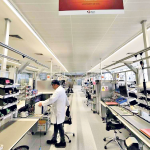Vulture funds set for shopping spree
Vulture funds are waiting for opportunities in the real estate, tourism and catering market in the wake of an expected major recession affecting Portugal along with the rest of Europe.
These funds wait for a fall in asset values to buy them at a low, reposition and repackage them if necessary, and sell them off at as a growing concern for a profit at a later date.
They moved into Portugal during the last economic crisis from 2011-2014 buying up failed shopping centres, resorts, hotels and businesses, invested and made them relevant for the new market conditions that followed.
With the crisis in Portugal last time around and the plummeting of real estate prices, Blackstone, one of the largest real estate funds in the world and based in the US, snapped up shopping centre bargains at knock-down prices and as the market bounced back sold these assets for a whopping €900 million.
Last year, before the Corona pandemic, many of the funds that had made a mint in Portugal left and turned their attentions to Greece.
At the time, Hugo Moreira, the General Director of Varde Partners, an investment management consultant that managed a portfolio of €14Bn, told Expresso it wasn’t a bad thing that they had moved onto fresh pastures because it showed the real estate market had recovered and consolidated.
But the question now is if these so-called vulture funds will find fresh pickings on the bones of failed businesses and projects, particularly those in tourism that face seeing an entire holiday season wiped out and don’t have the wherewithal to ride out the storm of an expected world recession.
In fact, there are already signs that the world’s biggest ‘distressed asset’ funds are swooping overhead to feast on the worst market turmoil since the Great Recession as they hope to swoop and pick up the debts of troubled companies at discounts.
The near shot down of Portugal’s economy which despite recovering in both the real estate and tourism sectors in a spectacular fashion from 2014 onwards and enjoyed higher than average growth rates compared to some Euro Zone competitors, has systemic fragilities and a still weak banking sector that makes it vulnerable to external shocks like the Coronavirus crisis.
“There are now huge opportunities for distressed debt funds, particularly in the transport, retail and hospitality sectors” according to Stavros Siokos, of real estate asset specialist Astarte Capital who spoke to Market Watch.
For distressed debt investors and private equity firms with specialist funds, buying the bonds of companies in financial difficulty can lead to better returns as they Arte compensated for the higher risk they are taking. The bet is that if the company returns to financial health and the bond prices goes up, they can make a killing.
At preset there are about 50 funds in the market looking to raise a total of US$34.8Bn including Apollo Global Management one of the world’s biggest and which has already invested €10Bn in credit and private equity and is looking for a new vehicle to find opportunities.
Other big funds looking to make big bucks include General Atlantic, JP Morgan Asset Management, CVC, Oaktree Capital, Lone Star, Bain Credit and many others.
However Portugal fares in the expected recession, vulture funds specialise in picking up bargains and they will be looking for opportunities and have the cash to splash.
But vulture funds aside, there are still property and savings funds which in the middle of the pandemic view Portugal as a safe haven for investments, particularly in real estate.
The French savings fund Corum opened an office in Portugal last year and has already invested €60 million since 2014.
Corum launched a campaign to promote its real eatate investment funds in Portugal under the slogan ‘IRS payback because I want you’ in which the fund challenges consumers to “take a small step” by investing their income tax returns in a long-term fund which will enable them to reap a profit.
The company specialises in investing the money it receives in purchasing commercial property for future rental via its two investment funds which last year reaped over 6%.
José Gavino, Director of Corum in Portugal says that real estate is always a less volatile investment than the stocks and shares market and even more so in the turbulent times that could be on the horizon because of the coronavirus pandemic










